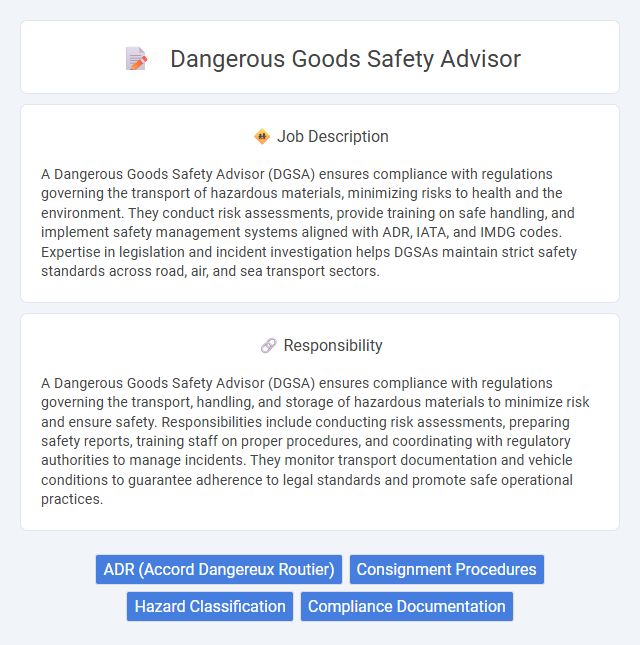
A Dangerous Goods Safety Advisor (DGSA) ensures compliance with regulations governing the transport of hazardous materials, minimizing risks to health and the environment. They conduct risk assessments, provide training on safe handling, and implement safety management systems aligned with ADR, IATA, and IMDG codes. Expertise in legislation and incident investigation helps DGSAs maintain strict safety standards across road, air, and sea transport sectors.
Individuals with strong attention to detail and a calm demeanor under pressure are likely well-suited for the role of Dangerous Goods Safety Advisor. Those who may experience high stress or discomfort working with hazardous materials might find this job challenging. The position probably demands individuals capable of thorough risk assessment and effective communication to ensure safety compliance.
Qualification
A Dangerous Goods Safety Advisor (DGSA) must possess comprehensive knowledge of hazardous materials regulations and transport laws, often demonstrated by completing a certified DGSA training course recognized by regulatory authorities. Candidates typically require a strong background in chemical safety, environmental health, or logistics, alongside practical experience in handling dangerous goods. Holding relevant certifications such as ADR, IMDG, or IATA Dangerous Goods Regulations is essential to ensure compliance and promote safe transportation practices.
Responsibility
A Dangerous Goods Safety Advisor (DGSA) ensures compliance with regulations governing the transport, handling, and storage of hazardous materials to minimize risk and ensure safety. Responsibilities include conducting risk assessments, preparing safety reports, training staff on proper procedures, and coordinating with regulatory authorities to manage incidents. They monitor transport documentation and vehicle conditions to guarantee adherence to legal standards and promote safe operational practices.
Benefit
A Dangerous Goods Safety Advisor likely enhances workplace compliance with hazardous materials regulations, reducing the risk of accidents and costly fines. Employers probably benefit from improved safety standards and minimized liability by having a dedicated expert to manage dangerous goods handling. This role may also contribute to fostering a safer work environment, potentially increasing employee confidence and productivity.
Challenge
The Dangerous Goods Safety Advisor (DGSA) role likely involves navigating complex regulations and ensuring compliance with stringent safety standards, presenting ongoing challenges. Managing the safe transport, storage, and handling of hazardous materials may require constant vigilance and quick problem-solving skills. The high responsibility to prevent accidents and environmental harm increases the job's difficulty and demands continuous learning and adaptability.
Career Advancement
Dangerous Goods Safety Advisor positions offer significant career advancement opportunities in regulatory compliance and risk management within transportation and logistics industries. Professionals can progress to senior advisory roles, safety management, or regulatory consultancy, leveraging expertise in hazardous materials handling and international safety regulations. Continuous certification and specialized training enhance career growth potential and salary prospects in this high-demand field.
Key Terms
ADR (Accord Dangereux Routier)
A Dangerous Goods Safety Advisor (DGSA) ensures compliance with ADR regulations governing the transport of hazardous materials by road. They conduct risk assessments, coordinate safety training, and oversee documentation to mitigate risks associated with dangerous goods handling and transportation. Proficiency in ADR requirements and updates is essential for maintaining safety standards and regulatory adherence in logistics operations.
Consignment Procedures
Dangerous Goods Safety Advisors (DGSAs) ensure compliance with consignment procedures by overseeing the correct classification, packaging, labeling, and documentation of hazardous materials. They train staff on regulations outlined in the ADR, IMDG, and IATA Dangerous Goods Regulations to prevent accidents during transport. Effective consignment management by DGSAs minimizes risks and ensures safe, legal movement of dangerous goods via road, sea, or air.
Hazard Classification
A Dangerous Goods Safety Advisor (DGSA) specializes in hazard classification to ensure the safe transport, handling, and storage of hazardous materials. This role requires expert knowledge of international regulations such as ADR, IMDG, and IATA DGR to accurately classify substances based on their chemical properties and potential risks. Proper hazard classification by a DGSA minimizes the risk of accidents and compliance violations during the logistics of dangerous goods.
Compliance Documentation
A Dangerous Goods Safety Advisor (DGSA) ensures compliance documentation aligns with international regulations such as ADR, IMDG, and IATA for the safe transport of hazardous materials. They oversee the preparation and maintenance of safety reports, incident records, and training documentation to meet legal requirements. Accurate compliance documentation is critical for risk management, regulatory audits, and preventing costly penalties in the transportation of dangerous goods.
 kuljobs.com
kuljobs.com